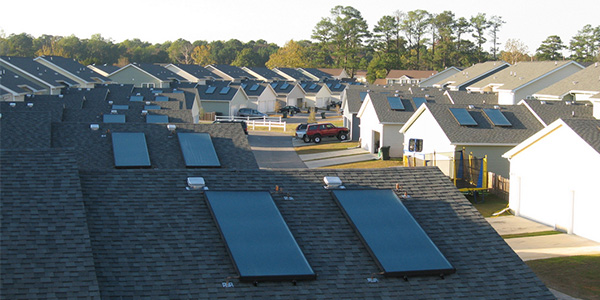By Robert Mullin
Rooftop solar aggregators scored a victory against paperwork Thursday when FERC issued a declaratory order exempting residential aggregations from certain filing requirements needed to obtain qualifying facility status under federal rules (EL18-205).
Residential solar company Sunrun last year petitioned the commission for two waivers related to QF certification under the Federal Power Act and the Public Utilities Holding Company Act.
The company — which has about 1,360 MW of PV capacity in 22 states and D.C. — does not currently make FERC-jurisdictional sales, but its petition signals it’s headed in that direction.
In its initial filing, Sunrun explained that it intends to pursue “emerging” opportunities for aggregated distributed energy resources in organized electricity markets. It noted it has received “increasing inquiries from lenders and investors regarding QF status and the regulatory exemptions it affords.”
But the company first needed to untangle some of the red tape that comes with operating QFs.
Under FERC regulations, a facility seeking QF certification must either file an application with the commission or submit a Form 556 for self-certification. QFs are also subject to the commission’s “1-mile” rule, which holds that any small power production facility located within 1 mile of another small facility using the “same energy resource” and having the same owner will be considered one facility when calculating whether a facility exceeds the 80-MW cap on QF eligibility.
To relieve the regulatory burdens of the smallest operations, FERC’s 2010 Order 732 exempted facilities with net production capacities of 1 MW or less from both the filing and self-certification requirements. In its 2016 SunE B9 Holdings LLC decision, the commission adopted the use of the 1-mile rule for establishing whether a facility meets the 1-MW threshold.
Sunrun noted that most of its homeowner clients elect to have the company retain ownership of their PV systems, which, collectively, would be deemed owned by the same entity for the purposes of FERC’s 1-mile rule. And while 99.5% of the company-owned systems have a nameplate capacity below 20 kW, the concentration of Sunrun’s growth is such that it will not be able to rely on the 1-MW filing exemption in the future in certain regions.
“When the commission established the current rules for QF certification, it expressed a clear intention to keep residential PV systems free from the obligation of filing QF certifications,” Sunrun said. “As a consequence, the QF certification requirements were not designed with residential-scale systems in mind.”
Sunrun asked FERC to waive the 1 MW, 1-mile QF certification filing requirement for rooftop PV systems, contending its request was narrowly tailored to apply only to small (20 kW or less), separately interconnected, individual residential systems that homeowners have the option to purchase.
In granting Sunrun’s request, FERC agreed the waiver “is not designed in a manner to circumvent the commission’s regulations. Rather, the geographic concentration of residential PV systems financed by Sunrun, and the fact that individual homeowners make these location and financing decisions based solely on individual homeowners’ personal preferences, create the need for the requested waiver.”
The commission also said the facts in its SunE B9 decision, which involved a large non-residential PV system with 18 500-kW inverters, were “distinguishable” from those in the Sunrun decision.
“Given the significantly larger number of individual residential PV system sites at issue here, however, and also the nature and size of these systems (i.e., residential systems with net capacities of 20 kW or less), as well as the fact that new residential customers may be added at any time and existing homeowners have the right to purchase the facilities subsequently, the administrative burden that Sunrun faces in order to remain in compliance with the commission’s regulations would be significantly greater in comparison to the burden faced” in SunE B9, FERC said.
The commission also granted Sunrun’s second requested waiver, so that when the company must submit a self-certification for systems greater than 20 kW, it is exempted from the requirement of including information related to systems 20 kW or less within 1 mile.
“The same reasoning that justifies the commission granting the first waiver request also supports granting the second waiver request,” the commission said. “In particular, given the already substantial and growing number of PV systems of 20 kW or less in Sunrun’s portfolio, coupled with the fact that new client homeowners are added frequently and existing client homeowners may at any time exercise their option to purchase their 20-or-less kW PV systems, the need to continuously update the Form No. 556 for these changes would place a significant burden on Sunrun and the commission without any obvious benefit.”





